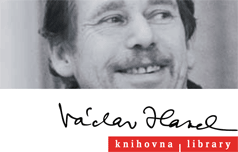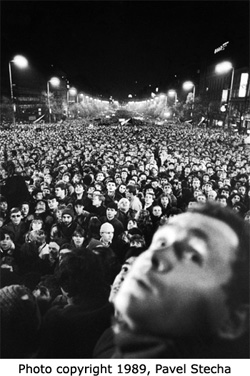|
|
Washington, D.C., November
17, 2004 - Fifteen years ago today, a modest, officially
sanctioned student demonstration in Prague spontaneously grew into
a major outburst of popular revulsion toward the ruling Communist
regime. At that point the largest protest in 20 years, the demonstrations
helped to spark the Velvet Revolution that brought down communism
in Czechoslovakia and put dissident playwright Václav Havel
in the Presidential Palace.
The November 17, 1989 march commemorated a student leader, Jan
Opletal, who was killed by Nazi occupiers 50 years before, but quickly
took on a starkly anti-regime character with calls of "Jakeš
into the wastebasket," referring to the communist party general
secretary, and demands for free elections. The authorities used
blunt force to disperse the students, injuring scores of people
including several foreign journalists. Hundreds were arrested.
The result was more demonstrations over the next three days that
completely exposed the bankruptcy of the regime. Czechoslovakia's
Velvet Revolution soon joined the historic chain of events begun
with Poland's roundtable talks and elections, Hungary's reintroduction
of a multi-party system, and just a week before the Prague protests,
the collapse of the Berlin Wall.
Now a new joint English-Czech edition volume has been published
in Prague which tells the extraordinary tale of the revolution.
The volume is entitled Prague-Washington-Prague:
Reports from the United States Embassy in Czechoslovakia, November-December
1989. What sets this volume apart from other accounts
is that it is a compilation of recently declassified U.S. State
Department cable traffic from the period. Released in response to
a Freedom of Information Act request by the non-governmental National
Security Archive, the cables not only provide quite accurate reporting
of the unfolding events but offer insights into U.S. thinking at
the time, including how the first demonstrations on this date in
1989 completely surprised American officials and forced them to
dramatically revise their estimates on the survivability of the
Communist regime in Prague.
 Of
particular note, this new volume is the first publication of the
Václav
Havel Library, which is still in the process of being
formed. (Its website, currently being developed, offers further
information about the book.) Of
particular note, this new volume is the first publication of the
Václav
Havel Library, which is still in the process of being
formed. (Its website, currently being developed, offers further
information about the book.)
The book's editor, Vilém Precan, is a long-time partner
of the National Security Archive who has been instrumental in bringing
new documentation to light and organizing international conferences
on the hidden history of Czechoslovakia and the Cold War. As indicated
by Radio Prague, the international service of Czech Radio, Dr. Precan
"worked untiringly with the National Security Archive …
to have the documents released."
From the book's Introduction: "It is unusual
for documents related to diplomacy to be published so soon after
their having been written … That the set of documents published
in this volume got into the hands of independent historians so soon
after their having originated is thanks to an American nongovernmental
institution with a name that will probably mean little to the layman
and might even be confusing. That institution is the National Security
Archive. It was established to gather and publish documents that
have been declassified on the basis of the U.S. Freedom of Information
Act (FOIA) .... The [Archive] has been more than successful in achieving
this aim."
From Vilém Precan's Acknowledgements:
"This volume is the result of the work of many people, whom
I as Editor now wish to thank. First and foremost I express my gratitude
to my friends and colleagues at the National Security Archive in
Washington D.C.: Tom Blanton, Catherine Nielsen, Svetlana Savranskaya,
and Sue Bechtel, owing to whose efforts the telegrams were made
available to independent researchers and were passed on to Prague,
and who were of great assistance to me while I was working in Washington.
"
Note about the book cover: Václav Bartuska,
the director of the Havel Library, made the following comment: The
photograph "is from the meeting where the transition of power
from commies to Civic Forum was discussed … The back of the
man you see at the bottom of the picture belongs to … guess
whom … I liked this idea of having Václav Havel there
right at the centre of all things, yet not visible at first. I think
this had been his place for a long time."
 Why
was the revolution non-violent? One of the many subplots
of the new compilation is the fact that, despite the authorities'
initial use of force to break up the November demonstrations, the
Velvet Revolution and similar events in other East European states
(with the notable exception of Romania) were allowed to take place
without Moscow resorting to bloody repression to keep its clients
in power. An earlier National Security Archive Electronic
Briefing Book from 1999 also explores this topic in
some detail, drawing on declassified records from a range of Russian
and East European archives. Why
was the revolution non-violent? One of the many subplots
of the new compilation is the fact that, despite the authorities'
initial use of force to break up the November demonstrations, the
Velvet Revolution and similar events in other East European states
(with the notable exception of Romania) were allowed to take place
without Moscow resorting to bloody repression to keep its clients
in power. An earlier National Security Archive Electronic
Briefing Book from 1999 also explores this topic in
some detail, drawing on declassified records from a range of Russian
and East European archives.
The spontaneous eruption of student protests in Prague instantly
recalled to the minds of U.S. embassy staff (as indicated in cables
included in this briefing book) earlier demonstrations in Eastern
Europe, such as in Hungary in 1956 and in Czechoslovakia on the
first anniversary of the Soviet invasion of 1968. In that context,
readers should note that some of the materials in the new Havel
Library volume are also to become part of an acclaimed book series
published by Central European University Press under the rubric,
The
National Security Archive Cold War Reader Series. This
series comprises volumes of once-secret documentation from the former
Soviet bloc and the West on each of the major upheavals in Eastern
Europe during the Cold War. The series will feature a special emphasis
on the revolutions of 1989 with separate volumes on Czechoslovakia,
Hungary and Poland. Titles already in print or at the publishers
include:
The
Prague Spring 1968,
edited by Járomír Navrátil et al (1998)
"I am happy that the cooperation between
the National Security Archive in Washington and the Czech foundation,
Prague Spring 1968, has resulted in this voluminous collection
of documents." - Václav
Havel
Uprising
in East Germany, 1953,
edited by Christian Ostermann (2001)
"This excellent collection of documents
pulls together what's been learned about [the uprising] since
the Cold War … It is an indispensable new source for the
study of Cold War history." - John
Lewis Gaddis
The
Hungarian Revolution of 1956, edited by Csaba
Békés, Malcolm Byrne and János Rainer (2002)
"There is no publication, in any language,
that would even approach the thoroughness, reliability, and
novelty of this monumental work." - István
Deák
A Cardboard Castle? An Inside History of the Warsaw
Pact, 1955-1991, edited by Vojtech Mastny and
Malcolm Byrne (Forthcoming, 2005)
Documents
Note: The following documents are in PDF format.
You will need to download and install the free Adobe
Acrobat Reader to view. Document
No. 1: Confidential Cable #08082 from U.S. Embassy
Prague to the Department, "Brutal Suppression of Czech Students'
Demonstration," November 18, 1989, 14:18Z
Source: Freedom of Information Act
Document
No. 2: Unclassified Cable #08087 from U.S. Embassy
Prague to the Department, "Embassy Protest of Attack on American
Journalists during November 17-19 Demonstrations in Prague,"
November 20, 1989, 12:20Z
Source: Freedom of Information Act
Document
No. 3: Confidential Cable #08097 from U.S. Embassy
Prague to the Department, "Demonstrations Continue Over Weekend
in Prague," November 20, 1989, 12:42Z
Source: Freedom of Information Act
Document
No. 4: Unclassified Cable #08106 from U.S. Embassy
Prague to the Department, "Czechoslovak Press Coverage of Demonstration
Aftermath Shows Contradictory Lines," November 20, 1989, 16:48Z
Source: Freedom of Information Act
Document
No. 5: Limited Official Use Cable from U.S. Embassy
Prague to the Department, "Czechoslovak Independents Establish
New Organization and List Agenda of Demands," November 20,
1989, 16:52Z
Source: Freedom of Information Act
Document
No. 6: Confidential Cable #08109 from U.S. Embassy
Prague to the Department, "American Woman's Account of November
17 Demonstration and the Death of a Czech Student," November
20, 1989, 16:54Z
Source: Freedom of Information Act
Document
No. 7: Confidential Cable #08110 from U.S. Embassy
Prague to the Department, "Popular and Soviet Pressure for
Reform Converge on the Jakes Leadership," November 20, 1989,
16:57Z
Source: Freedom of Information Act
Document
No. 8: Confidential Cable #08144 from U.S. Embassy
Prague to the Department, "Demonstrations in Prague and Other
Czechoslovak Cities November 20," November 21, 1989, 15:20Z
Source: Freedom of Information Act
Document
No. 9: Confidential Cable #08153 from U.S. Embassy
Prague to the Department, "Student Strike Situation Report,"
November 21, 1989, 18:59Z
Source: Freedom of Information Act
Document
No. 10: Confidential Cable #08155 from U.S. Embassy
Prague to the Department, "Morning Demonstration at Wenceslas
Square: Overheard Conversations," November 21, 1989, 19:01Z
Source: Freedom of Information Act
|

